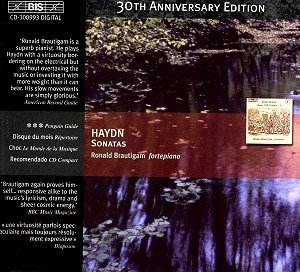In
celebration of its 30th anniversary, BIS has reissued
thirty recordings from its back inventory at mid-price for a limited
time from July through December of this year. Ronald Brautigam
has been traversing on fortepiano a cycle of the complete Haydn
Keyboard Sonatas, and Volume 2 of the series is part of the anniversary
celebration.
Although
there has been much debate concerning the use of modern piano
vs. fortepiano for Haydnís Sonatas, the dust seems to have settled
with both types of instruments now considered appropriate. In
fact, we are even seeing early Haydn Sonatas recorded on the harpsichord.
I
had the pleasure a few months ago of reviewing a 10-cd set of
all the Haydn Keyboard Sonatas issued by Brilliant Classics. Using
five different artists and a variety of fortepianos, the Brilliant
Classics box set is an outstanding bargain as the performances
are uniformly excellent and the price corresponds to less than
one-half the cost of a Naxos recording.
When
Ronald Brautigamís series began a few years ago, it essentially
had the Haydn fortepiano field to itself. With the release of
the Brilliant Classics box set, the situation has changed greatly.
Prospective buyers now can weigh the net advantages of acquiring
the Brautigam recordings at full-price when an exceptional set
of Haydnís Sonatas is available at only a fraction of the cost.
Fortunately, the reissue of Brautigamís Volume 2 at mid-price
allows interested parties to investigate his interpretations without
shelling out top dollar. Still, it would appear reasonable that
Brautigam must bring something distinctive or superior to the
table to justify BIS prices.
Digressing
a little, Haydnís solo keyboard music does not enjoy the immense
popularity of his string quartets or symphonies. I find this slightly
perplexing as the solo music displays the signature traits of
his most revered music: brilliant sparkle, a rhetorical bent,
improvisation, aristocracy, perfect structure, and a wide expressive
range. Any keyboard artist needs to well convey these factors,
and Brautigam attractively meets the requirements. However, the
artists on the Brilliant Classics box set are also up to the challenge.
There
are two significant differences between the Brautigam and Brilliant
Classics recordings. One is that Brautigam uses very quick tempos
and is consistently faster than each of the artists for Brilliant
Classics. The faster tempos certainly carry the potential for
enhanced excitement, but they also reduce the window for ample
breathing room. The other difference is that Brautigamís soundstage
has more resonance and brightness.
How
each listener will respond to Brautigamís quicker pacing and brighter
soundstage is largely dependent on subjective personal choice.
Those who prefer their Haydn on the fast side should derive much
pleasure from the Brautigam performances. My personal taste veers
toward more moderate tempos where Haydnís lines are clearly delineated.
Frankly, I find some of Brautigamís tempos of the break-neck variety.
A typical example is his performance of the 2nd Movement
"Allegro di molto" from Sonata No. 55 in B flat minor.
Brautigam polishes off the movement in just over 2 minutes while
most performances approach the three-minute range.
The
specific program of Brautigamís Volume 3 offers six excellent
sonatas highlighted by the masterful Sonata No. 58 in C major.
Rhetoric and improvisation becomes common in Haydnís more mature
works, and the 1st Movement "Andante con espressione"
represents the full flowering of Haydnís rhetorical bent. Both
Brautigam and Yoshiko Kojima for Brilliant Classics thrive on
the musicís rhetorical and improvisational elements, Brautigam
being the more perky while Kojima is rather introspective. I am
also familiar with a recording of the C major on fortepiano performed
by Lola Odiaga on the Titanic label that is every bit as rewarding
as the Brautigam and Kojima interpretations.
In
summary, I have very high regard for the Ronald Brautigam performances
of Volume 2 and the entire series as well up to this point in
time. However, the Brilliant Classics box set offers excellence
of interpretation at super-bargain price that has to place it
as the standard for fortepiano recordings of Haydnís Keyboard
Sonatas. For those wanting only one set of performances for their
library, Brilliant Classics is surely the avenue to pursue.
If
more than one is desired, by all means check out Brautigam and
Odiaga. There are also other recordings on fortepiano and/or harpsichord
that deserve your exploration including those by Robert Hill and
Malcolm Bilson. We are reaching a golden era for Haydn on early
keyboard instruments and might as well take full advantage of
the situation.
I
havenít mentioned Alfred Brendelís recordings of Haydn Keyboard
Sonatas on Philips, but his performances transcend matters of
early vs. modern piano. I consider him the king of this repertoire,
and no collection should be without his superior interpretations.
Other
modern piano recordings worth noting include Andras Schiff on
Teldec, Nadia Reisenberg on Ivory Classics, Glenn Gould on Sony,
Zoltán Kocsis on Hungaroton, Dezsö Ránki on
Hungaroton, Gilbert Kalish on Nonesuch, Leif Ove Andsnes on EMI,
John McCabe on Decca, and Mikhail Pletnev on Virgin Classics.
Haydnís
solo keyboard music may not be very popular with the public, but
the recorded legacy is quite impressive. I strongly recommend
that readers not familiar with this corpus of Haydnís music acquire
one or more of the many excellent recordings on the market and
discover how wonderfully Haydn wrote for the keyboard.
Don
Satz

![]() Ronald Brautigam, fortepiano
Ronald Brautigam, fortepiano
![]() BIS - CD-300993 [74:23]
BIS - CD-300993 [74:23]